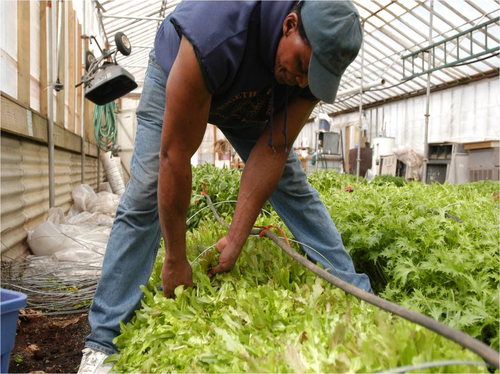
Will Allen harvesting (Photo credit: Growing Power)
Back-to-back films on agriculture at the World Community Film Festival this afternoon left me uplifted and feeling like change is on the horizon. Dirt! The Movie, Fresh and A Thousand Suns reminded me how many people there are who think like me — including those attending the event — and what amazing impacts these people are making around the world.
One farmer in the US took it upon himself to build a wind farm on his farm as security for survival. (Actually, I think that was part of Dirty Business, a film about coal and energy which followed. I saw four films in 6 hours, so please forgive me if I confuse them.) Will Allen, a former basketball player, returned to his family’s farming roots and started Growing Power, where compost is everything. Joel Salatin is a farming hero, Michael Pollan speaks the truth in terms people can understand, schools are tearing up asphalt for gardens, and rehabilitation programs for inmates are reconnecting people with the land.
Continue reading Fresh Dirt! »
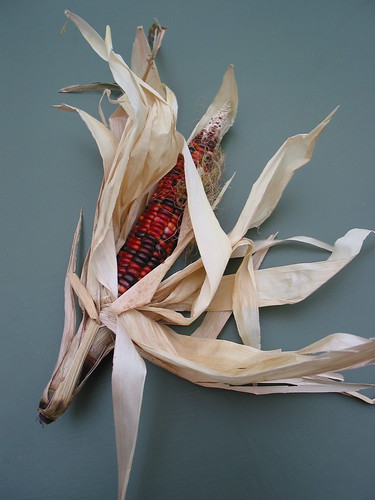 Update: The Tyee blog The Hook reports GMO bill struck down in Ottawa.
Update: The Tyee blog The Hook reports GMO bill struck down in Ottawa.
It took me almost four years to find out that in 2007 the US Department of Agriculture approved commercial production of the first genetically modified food crop containing human genes, a “laboratory-created rice [that] produces some of the human proteins found in breast milk and saliva.” In my head, my reaction to this was incredible disgust mingled with angry expletives and a little bit of fear. From what I’ve learned about genetically modified organisms, this paves the way for the seeds to be patented — in other words, effectively patenting human genes. Patenting pig genes was bad enough.
I’m extremely skeptical that the “good intentions” of treating “children with diarrhoea, a major killer in the Third World”, are actually valid. Genetic modification has a history of being touted as a way to solve food shortages, but they wind up leaving GM farmers poor, and organic farmers sued when seeds contaminate their crops. As for these children, attempting to treat them with GM products — any negative consequences of which may be unknown — is akin to us focusing the bulk of our efforts on curing cancer and diabetes and almost completely ignoring prevention. We should be ensuring access to healthy food, clean water, and education. Whatever Monsanto and other GE agribusinesses say about solving developing nations’ problems with their products is complete bullshit.
Continue reading A single GMO crop is one too many »
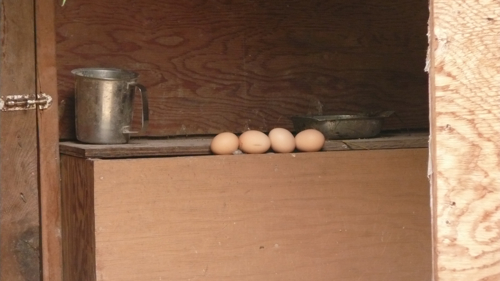
Eggs at a family farm in Pemberton, BC
The sled dog mass killing in Whistler recently has sparked outrage, leading to some much-needed discussion about the unethical treatment and slaughter of animals that we tend to ignore: factory farm animals and grizzly bears. After a cat was thrown in a garbage can, fuelling world-wide fury, a question was posed whether food animals are “victims of their poor image”. Considering dogs and cats appear to get all the attention, I’d have to agree.
I wrote the following text almost three years ago for an Environmental Ethics essay, but I was already beyond the word limit and didn’t include it. You can probably expect to hear more about factory farming from me as this series continues (unless you help me reach my $300 fundraising goal!). Later, I’ll dig up and add some more information that came to light well after this was written.
Chicken and eggs
The deplorable conditions in which hens and “broiler chickens” are kept are becoming known to the public. Canada’s egg industry relies, as does its pork industry, on “the extreme confinement of animals to the point of virtual immobilization — in the name of efficiency” (Youngman). Of the country’s 26 million laying hens, 98 per cent are confined in wire-mesh “battery cages” of four or more birds each, cages so small they cannot even flap or spread their wings. By the time the hen is considered unproductive, “she is often bald from feather-pecking and the constant grinding of her body against the wire mesh and other birds” (Youngman) and her entire body is in terrible condition. Battery cages are, of course, unnecessary for egg production. “They are used because they allow eggs to be produced under factory-like conditions, thus lowering the market price of the eggs. The chicken’s living conditions subsidize the true cost of the eggs you eat (Vancouver Humane Society).
Continue reading Where do your eggs come from? »

My bathroom shelf: Toothpaste, coconut oil, shea butter, oregano oil, floss and deodorant
Let’s face it: women use more products than men, and we have a recurring, generally very wasteful (but otherwise healthy) function that they don’t have. But this doesn’t mean we need to create more garbage than these low-maintenance dudes. If you live in Metro Vancouver, you’ve seen the ads, you’ve seen the news. We create a lot of garbage, and we can’t throw it on Cache Creek forever. Our rubbish has to go somewhere, so it’s time to try harder to avoid creating it in the first place. (It’s reduce, reuse, recycle, remember.) But you’re a girl, and you have needs. Now what?
Simple.
1. Get an “eco positive period“ with the Diva Cup and a combination of smart panties and reusable cloth liners and pads. The fabrics are organic cotton and the Diva Cup merely collects your flow, so you can avoid nasty things like toxic shock syndrome and yeast infections. Other benefits? No smelly waste, no crinkly noises from plastic pads, no discomfort, and no worries about running out. Yes, it can be discreet, super fun, and still feel sexy. It will simply make your life easier, save you money and time in the long run, and reduce your footprint on the planet big time. If you’re still not convinced, read their testimonials and their tips. Lunapads is based in Vancouver. Hint: sign up for their newsletter and grab the Green Zebra coupon book to save some dough.
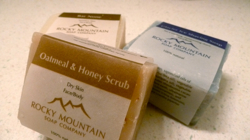 2. Happy soap! If you’re not into making your own, skip the shrinkwrap, the toxins and the plastic pumps with Rocky Mountain Soap Company‘s earth-friendly bar soap, wrapped in just a strip of paper. (Mountain Sky is another option.) They also sell a shaving* soap bar. I know you think you need foam to shave, but I dare you to try this stuff for a month and see the difference. I used to use bar soap that wasn’t even meant for shaving, then tried a foam cream in an aerosol can (what was I thinking?!). Rocky Mountain wins hands down. Their Vancouver store is on Granville & 15th, and they sell unscented soap too.
2. Happy soap! If you’re not into making your own, skip the shrinkwrap, the toxins and the plastic pumps with Rocky Mountain Soap Company‘s earth-friendly bar soap, wrapped in just a strip of paper. (Mountain Sky is another option.) They also sell a shaving* soap bar. I know you think you need foam to shave, but I dare you to try this stuff for a month and see the difference. I used to use bar soap that wasn’t even meant for shaving, then tried a foam cream in an aerosol can (what was I thinking?!). Rocky Mountain wins hands down. Their Vancouver store is on Granville & 15th, and they sell unscented soap too.
Continue reading 7 simple ways to reduce bathroom waste »
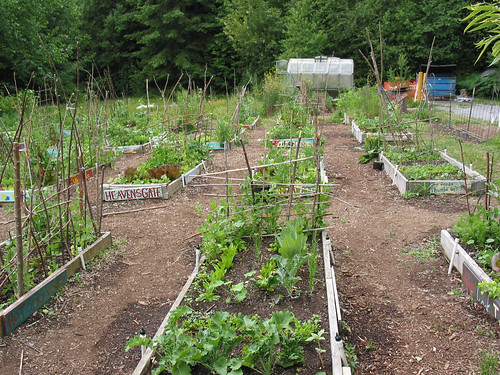
I was criticized once by someone who didn’t believe that my choice to not buy broccoli from China and peppers from California in the wintertime would make any difference. I would indeed be acting alone and in vain if everyone lacked faith in the power of the collective. After all, revolutions and rallies are composed of individual people sharing a common purpose. My argument was that if enough of us did not buy Californian peppers in December, it would affect the amount purchased by the store that carried it, impacting up the chain and so forth. It seems like a naive thought but the popularity of eating local has been growing, and with good reason. Eating local and in season offers many benefits including support of small-scale agriculture and healthier, more flavourful food. In terms of climate change, supporting local agriculture and in tandem avoiding foods — especially processed and pre-packaged foods — that have travelled a long distance make a huge impact. Agriculture is as responsible for greenhouse gas emissions as is transportation, based on a system designed around accessing foods year-round and producing these foods in large quantities to be shipped long distances.
Continue reading Start small, dream big for climate change »

I hope my lack of writing lately is a sign of a good social life rather than exhaustion. Here is finally my experience at the recent slow food cycle.
The gems are often tucked away at the end of a road. Like last year’s treasures in Pemberton, the most wonderful spots in Agassiz’s slow food cycle route lay a ways down a road or off a nondescript path you only just had to trust would lead somewhere.
At one end of the self-guided, circuitous route through Agassiz’s sprawling farmland and country houses was a paradise I could not have expected. The Back Porch seemed to suggest with its name a rustic and romantic place. Greeted by dozens of bikes, we found ourselves on a farm that could have been transplanted from the artsy, organic culture of BC’s Gulf Islands. A pottery studio and coffee grinding shop occupied the first outbuilding, a unique combination that was at once odd and harmonious. Antique coffee grinders (ca. 1919) sat among vintage graphic design pieces which tickled my design nerd fancy!
Continue reading I was a country bumpkin »

Update August 8th
Well, my post was unfortunately premature… by a year, now, in fact, as this year’s Slow Food Cycle Sunday has been cancelled due to the forest fires. The 5th annual event will occur August 15th, 2010. I’m very disappointed, but all is not lost as on the 22nd and 23rd there are cycle farm tours in Agassiz and Chilliwack by Slow Food Vancouver, although these require advanced registration and cost $10 — $20. I’m going to get on that and invite the folks who were planning to attend the Pemberton event. Too bad! If you still want the amazing potatoes, however, visit a Vancouver Farmers Market and look for Helmer’s.
On Sunday, August 16th, we’re celebrating the 5th annual Slow Food Cycle Sunday in scenic Pemberton, BC.* The flat, paved road through the farming valley is perfect for cyclists of any age and skill level. And of course, what we’re ultimately drawn together here for is the food! After my first trip last year, which was capped by a traffic jam on the way home that had us moving slower than a kid on a bicycle, I felt the potatoes alone were SO worth the 50 km ride and the road trip. They are phenomenal.
Continue reading Cancelled: Slow Food Cycle Sunday in Pemberton. Instead: Agassiz & Chilliwack Aug 22 & 23 »
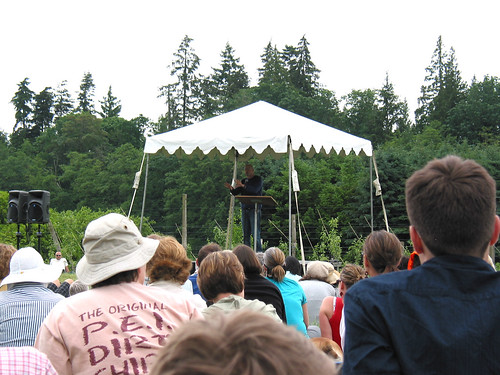
With lucky last-minute tickets, I attended an engaging talk by author Michael Pollan (The Omnivore’s Dilemma) at Vancouver’s spectacular UBC Farm this afternoon. This was his only Canadian stop on a book tour for the paperback edition of In Defense of Food: An Eater’s Manifesto (reviewed here earlier this week) and the location could not have been more appropriate. The afternoon included a quick farm tour after the talk, upon which I’ll touch later. It was cloudy for the talk, quite gladly, then the sun showed up afterward and made the place look like paradise! I enjoyed eating a yummy home-made salad and watching others eat around me. The event sold out all 670 tickets, and each person received a signed copy of the book.
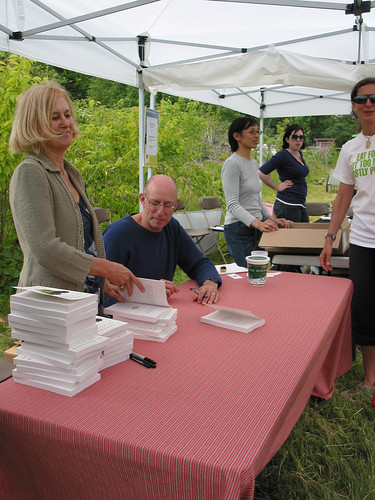
Continue reading Michael Pollan at UBC Farm »
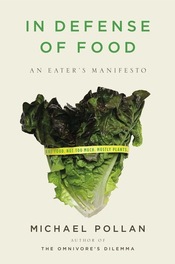 If that title seems confusing at first, the sentiment simply represents the chaotic experience of the modern North American in deciding what to eat.
If that title seems confusing at first, the sentiment simply represents the chaotic experience of the modern North American in deciding what to eat.
With thousands of choices at the supermarket, diet advice that changes every year, and a regular barrage of the “latest studies” that turn previous ones on their heads, it’s no wonder we’re looking for simple solutions. From fad diets to the latest incarnation of margarine (50% lower in calories!), what to eat and how much is often up to the discretion of our sources — the most prominent of which have other motives besides your health in mind. And even if you think you know what to eat and are feeling pretty healthy, chances are you can still do better. Michael Pollan, recognising this conundrum, offers seven words that will change your life in the most literal sense: “Eat food. Not too much. Mostly plants.”
In the first two of three parts of his fifth book, In Defense of Food: An Eater’s Manifesto (2008), Pollan illustrates in depth the problems with our food (in the broadest sense possible) and how it is we arrived here. The history is fascinating, and it is that which helps the reader understand why and how we got here, who the key players are and, ultimately, how to go about fixing it. As it turns out, the history goes back a long way.
Continue reading “You are what what you eat eats too” »
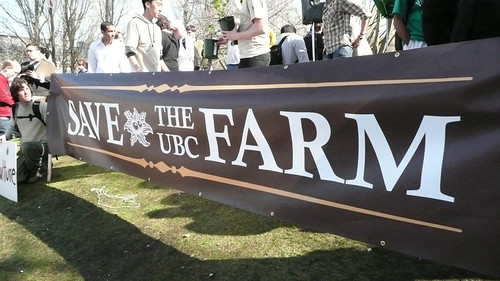
Imagine, if you will, your favourite summer street festival or an indie parade. Add a joyous rallying cry, one amazing cause and 24 beautiful hectares of farmland in a wild corner of Vancouver. This mix of music festival and protest march made Tuesday’s Great Farm Trek to UBC Farm the highlight of my year so far, on the most gorgeous spring afternoon we could possibly hope for.
When I got off the bus at UBC, finding the Student Union Building wasn’t too difficult: I followed the drumming noises (percussion ensemble Sambata) and the hum of a thousand voices gathered in the square. I was pleasantly stunned to see how many people turned out.
The opening speaker began soon after I arrived. Ben recorded a video of the inspirational speech by Shane Pointe (Musqueam Nation). I recorded some of it but his view was better. The crowd exploded in cheers when he encouraged us. I fell into awe and silence during his song.
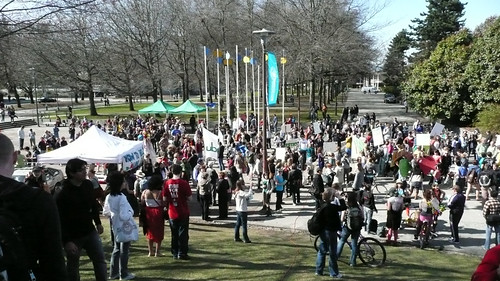
Continue reading UBC Farm Trek: a huge, fantastic, musical success! »
 Will Allen harvesting (Photo credit: Growing Power)
Will Allen harvesting (Photo credit: Growing Power)
 Update: The Tyee blog The Hook reports
Update: The Tyee blog The Hook reports  Eggs at a family farm in Pemberton, BC
Eggs at a family farm in Pemberton, BC
 2. Happy soap! If you’re not into making your own, skip the shrinkwrap, the
2. Happy soap! If you’re not into making your own, skip the shrinkwrap, the 






